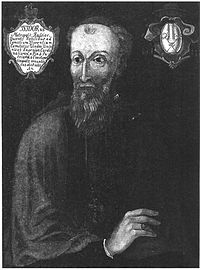Isidore of Kiev
|
His Eminence Isidore of Kiev |
|
|---|---|
| Latin Patriarch of Constantinople | |
 |
|
| Diocese | Constantinople |
| Installed | 20 April 1458 |
| Term ended | 27 April 1463 |
| Other posts | Cardinal-bishop of Sabina |
| Orders | |
| Consecration | 1437 |
| Created Cardinal | 18 December 1439 |
| Rank | Cardinal-Bishop |
| Personal details | |
| Born | 1385 Monemvasia, Byzantine Greece, Byzantine Empire |
| Died | 27 April 1463 Rome, Papal States |
| Nationality | Greek |
| Denomination | Roman Catholic (formerly Eastern Orthodox) |
| Previous post |
|
| Coat of arms | |
|
Styles of Isidore of Kiev |
|
|---|---|
 |
|
| Reference style | His Eminence |
| Spoken style | Your Eminence |
| Informal style | Cardinal |
| See | Sabina e Poggio Mirteto (suburbicarain) |
Isidore of Kiev, also known as Isidore of Thessalonica (Greek: Ἰσίδωρος τοῦ Κιέβου; Russian: Исидор; Ukrainian: Ісидор; b. Peloponnesus, 1385-d.Rome, 27 April 1463) was a Greek Metropolitan of Kiev, cardinal, humanist, and theologian. He was one of the chief Eastern defenders of reunion at the time of the Council of Florence.
Isidore of Kiev was born in southern Greece in circa 1385. He arrived at Constantinople, became a monk, and was there made hegumenos of the monastery of St Demetrius. He knew Latin well, and had considerable fame as a theologian. He was also an accomplished orator; he seems from the beginning to have been eager for reunion with the West.
It was the time when the Court of Constantinople, on the eve of its final destruction by the Turks, was considering the chance of rescue from the Western princes as a result of reuniting with Rome. In 1434 Isidore was sent to Basle by John VIII Palaiologos (1425–1448) as part of an embassy to open negotiations with the Council of Basle. Here he made a mellifluous speech about the splendour of the Roman Empire at Constantinople. On his return he continued to take part in all the preparations for reunion among his own people.
...
Wikipedia
